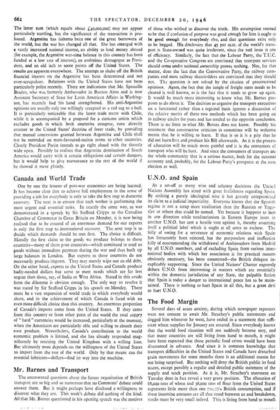Mr. Barnes and Transport
The unanswered questions about the future organisation of British transport are so big and so numerous that no Commons' debate could answer them. But it might perhaps have disclosed a willingness to discover what they are. This week's debate did nothing of the kind. All that Mr. Barnes questioned in his opening speech was the motives
of those who wished to discover the truth. His assumption seemed to be that if confusion of purpose was good enough for him it ought to be good enough for everybody else, and that questions exist only to be begged. His disclosure that 45 per cent. of the world's trans- port is State-owned was quite irrelevant, since the real issue is one of efficiency. Similarly, the fact that the Labour Party, the T.U.C. and the Co-operative Congress are convinced that transport services should come under national ownership proves nothing. Nor, for that matter, does the fact that the Conservative Party, the railway com- panies and most railway shareholders are convinced that they should not. The question is not solved by the citation of preconceived opinions. Again, the fact that the jungle of freight rates needs to be cleared is well known, as is the fact that it tends to grow up again. It would be much more interesting to know what Mr. Barnes pro- poses to do about it. The decision to organise the transport executives on a functional rather than a regicnal basis ignores a discussion of the relative merits of these two methods which has been going on in railway circles for years and has tended to the opposite conclusion. There is no limit to what Mr. Barnes does not know. Possibly his statement that constructive criticism in committee will be welcome means that he is willing to learn. If that is so it is a pity that he did not learn first and produce his Bill afterwards. As it is the process of education will be- much more painful and it is the consumers of transport who will be hurt. And since the consumers of transport are the whole community that is a serious matter, both for the national economy and, probably, for the Labour Party's prospects at the next election as well.


































 Previous page
Previous page